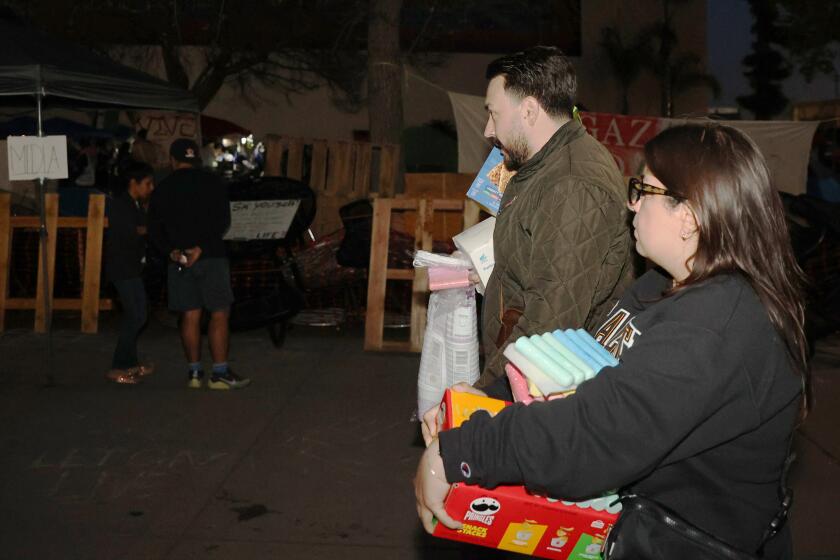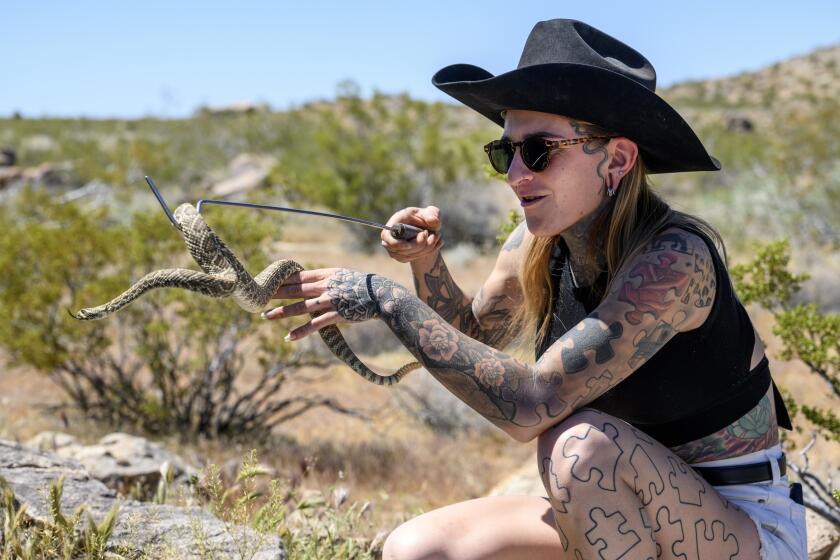Life Sentence of ‘Career Criminal’ Reversed; Judge Orders a New Trial
Warren James Bland, who was labeled a career criminal last year by a San Diego federal judge and ordered to prison for the rest of his life without parole, has won a reversal of his sentence from a federal appeals court.
The U.S. 9th Circuit Court of Appeals reversed Bland’s life-without-parole sentence--for gun possession by a repeat felon--because U.S. District Judge J. Lawrence Irving, who presided over the case, improperly told jurors that Bland was wanted in the murder of a 7-year-old Pasadena girl.
The ruling, issued Wednesday by the San Francisco-based court, entitles Bland, 54, of Los Angeles, to a new trial on the gun charge, which federal prosecutors indicated Thursday they are likely to pursue. He also faces a pretrial hearing on the murder charge July 31 in Riverside County, according to Municipal Court records.
Bland was the first prisoner in California and only the fourth in the nation to be sentenced to life without parole under a relatively recent federal law that targets repeat offenders.
Five times over the past three decades, Bland has been released from prison. Five times, he has been rearrested for terrorizing women and children in a series of sexual assaults in Southern California.
When Irving imposed the life term last August, he called Bland a “vicious, incorrigible predator.” Because of Bland’s bespectacled, grandfather-like appearance, Irving said, he is “particularly dangerous” and a “wolf in sheep’s clothing.”
Bland was most recently released from prison in 1986.
In February, 1987, he was wounded and arrested by San Diego police and charged in the torture and murder of 7-year-old Phoebe Ho of South Pasadena, whose body was found in a Riverside County ditch. She had disappeared while walking to school in December, 1986.
Bland also has been named as a suspect in the slayings of Wendy Osborn, 14, of Placentia in Orange County, and Ruth M. Ost, 81, of San Diego,
San Diego police had been looking for Bland on the Riverside murder warrant. Officers found a gun in his car.
Bland, who had spent 21 of the previous 26 years in either prison or mental institutions, was charged under a 1986 federal “career criminal” law with possession of a gun by a felon with at least three serious convictions. The law set maximum punishment as a no-parole life term.
According to 9th Circuit Judge Edward Leavy, Bland had been visited after his arrest in San Diego by his parole officer, who advised him of his right to remain silent but failed to tell him that he had a right to have a lawyer present.
Bland then admitted having stolen the car and the gun, Leavy said. That confession, Leavy ruled Wednesday, will be barred at a retrial because the warning did not meet constitutional muster.
Bland’s primary defense to the gun charge was his claim that the weapon had been planted in the car by police to justify the shooting, Leavy said. Federal prosecutors said the officer was justified in shooting based on his knowledge of the murder warrant against Bland.
During pretrial questioning and over defense objections, Judge Irving told prospective jurors about the warrant and the planned police testimony that the warrant for Bland was in connection with the “molestation and torture and murder of a 7-year-old girl.”
Irving ordered potential jurors to consider the warrant only to show the policeman’s state of mind when he shot Bland, not as proof that Bland was guilty of murder.
Leavy, however, said the evidence should simply have been excluded because it was irrelevant to the gun case. It would have been enough, he said, to tell jurors, as San Diego defense lawyer Mario Conte had offered to do, that the warrant justified shooting Bland as a fleeing felon, without discussing the warrant’s details.
“We cannot expect jurors to remain impartial when information that should not have been mentioned permits them to believe that acquitting (Bland) may mean releasing an exceedingly dangerous child molester and killer into the community,” Leavy said.
Judges Stephen Reinhardt and Pamela Ann Rymer concurred in the opinion.
Assistant U.S. Atty. Judith Feigin in San Diego, who handled the case on appeal, said Thursday that prosecutors are committed to a second trial. However, the government may still ask the 9th Circuit for a rehearing of Wednesday’s decision, she said.
The prosecution had contended that the information in the murder warrant never would have been mentioned if the defense had not insisted on bringing the shooting incident into the case, Feigin said.
Despite Wednesday’s opinion, Bland remains in federal prison pending further court action, U.S. Atty. William Braniff said.
More to Read
Start your day right
Sign up for Essential California for news, features and recommendations from the L.A. Times and beyond in your inbox six days a week.
You may occasionally receive promotional content from the Los Angeles Times.






